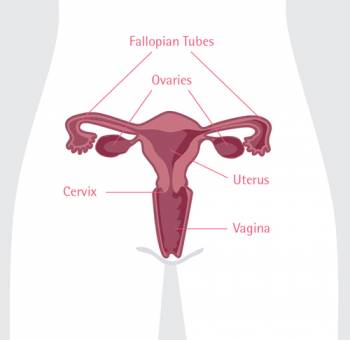Ovarian Cancer
Ovarian cancer refers to malignant growth arising from different parts of the ovaries. The ovaries are part of a woman’s reproductive system, where the eggs are developed. Most ovarian cancers are classified as "epithelial" and arise from the surface (epithelium) of the ovary. Other types arise from the egg cells (germ cell tumor) or supporting cells (sex cord/stromal).
How common is Ovarian Cancer?
 Ovarian cancer is the 5th most common cancer among the women in Singapore. There were a total of 1,506 cases diagnosed from year 2007 to 2011 based on the Singapore Cancer Registry Annual Registry Report. It is the second most common female genital tract cancer.
Ovarian cancer is the 5th most common cancer among the women in Singapore. There were a total of 1,506 cases diagnosed from year 2007 to 2011 based on the Singapore Cancer Registry Annual Registry Report. It is the second most common female genital tract cancer.
Age of Onset
Epithelial ovarian cancer usually affects older women although it can also happen to younger women. Germ cell cancers of the ovary occur more frequently in younger women.
What Causes It?
Risk factors associated with ovarian cancer include:
• Late pregnancy
• Early onset of menstruation
• Late menopause
• Never had children-history of breast cancer
• Genetic predisposition
• Endometriosis
Ovarian cancer is known to run in some families where family members may have increased risk of getting ovarian, breast and endometrial cancer(e.g. BRCA gene abnormalities) or increased risk of getting endometrial cancer, colorectal cancer in addition to ovarian cancer (Lynch syndrome). In women who have a sister or mother with this disease, the risk of developing ovarian cancer is increased twenty-fold. Ovarian cancer also runs in certain families with a history of breast and colon cancers. There is now evidence to suggest that certain genes are involved in causing these diseases.
Signs and Symptoms
 Early ovarian cancer rarely has symptoms or signs. Symptoms tend to develop only when the cancer is advanced.
Early ovarian cancer rarely has symptoms or signs. Symptoms tend to develop only when the cancer is advanced.
These symptoms include:
• Abdominal swelling and discomfort
• Bloating
• Persistent indigestion, gas or nausea
• Changes in bowel habits, such as constipation
• Loss of appetite
• Back pain
Diagnosis & Assessment
Treatment & Care
What treatment is offered?
To determine the actual extent of the cancer, surgical exploration or staging is required. During the procedure, the doctor will examine the peritoneum, which is the inner lining of the abdomen. Fluid within the abdomen is sent for assessment which involves analysis under a microscope. Besides determining the stage of the cancer, the aim of surgery is to remove as much of the cancer as possible. Often this includes removing ovaries, the uterus and its surrounding lymphatics.
Additional treatment following surgery will be determined by the stage of the disease, the grade of the disease and the type of cancer.
For very early stage disease and non-aggressive types, further treatment may not be required. For more advanced and aggressive types of cancers, chemotherapy is the treatment of choice.
Prognosis of Ovarian Cancer
Ovarian cancer in the early stage has high chance to cure while those in the late stage of the cancer, permanent cure may be difficult.
What kind of support is available?

CanHOPE, is a non-profit cancer counselling & support service initiated by Parkway Cancer Centre.
As part of the holistic approach towards cancer treatment, CanHOPE works closely with the medical & allied health professionals, offering a wide range of resources & information about cancer in helping patients & their caregivers to make effective, informed decisions in their treatment journey.
Join us in our support programmes that are available on a monthly basis.
CALL our CanHOPE counsellors: +65 67389333 or e-mail:
What Is Ovarian Cancer? originally appeared on Parkway Cancer Centre and has been republished with permission
Further Reading
The article above is meant to provide general information and does not replace a doctor's consultation.
Please see your doctor for professional advice.
